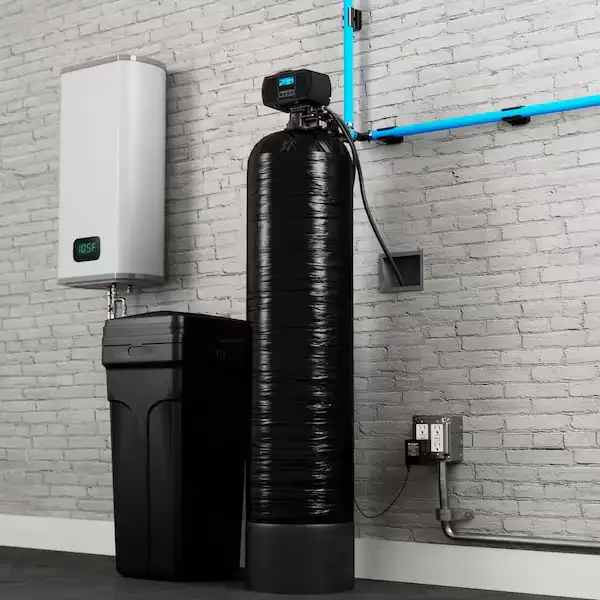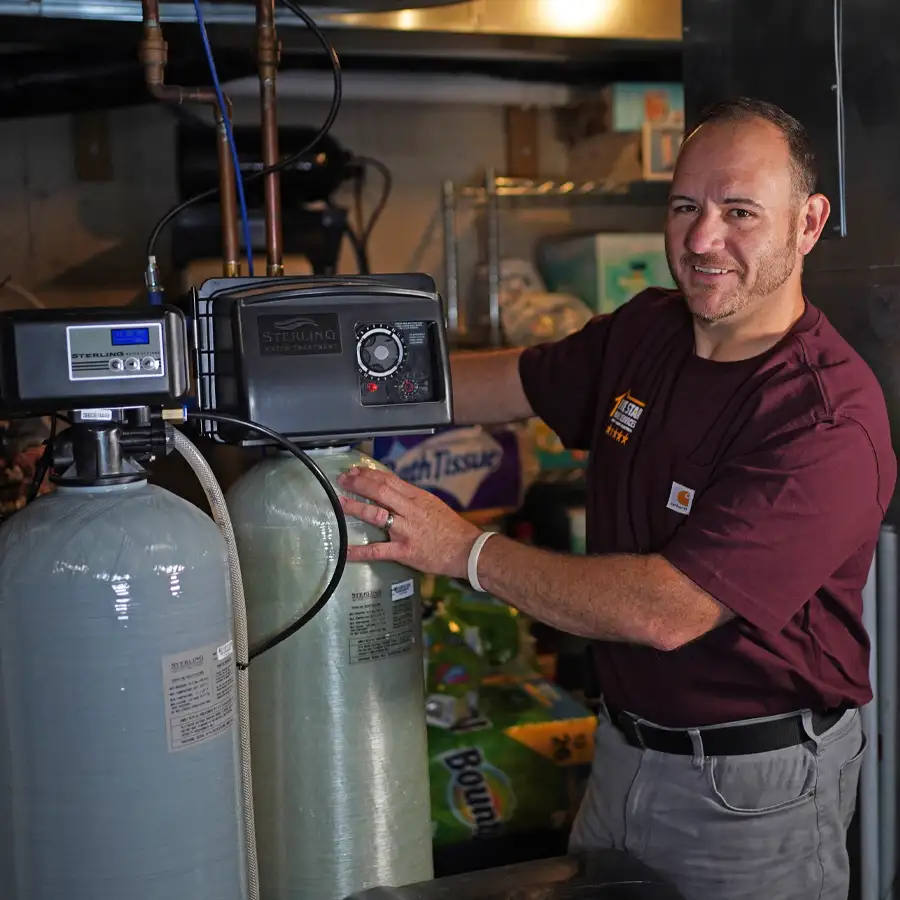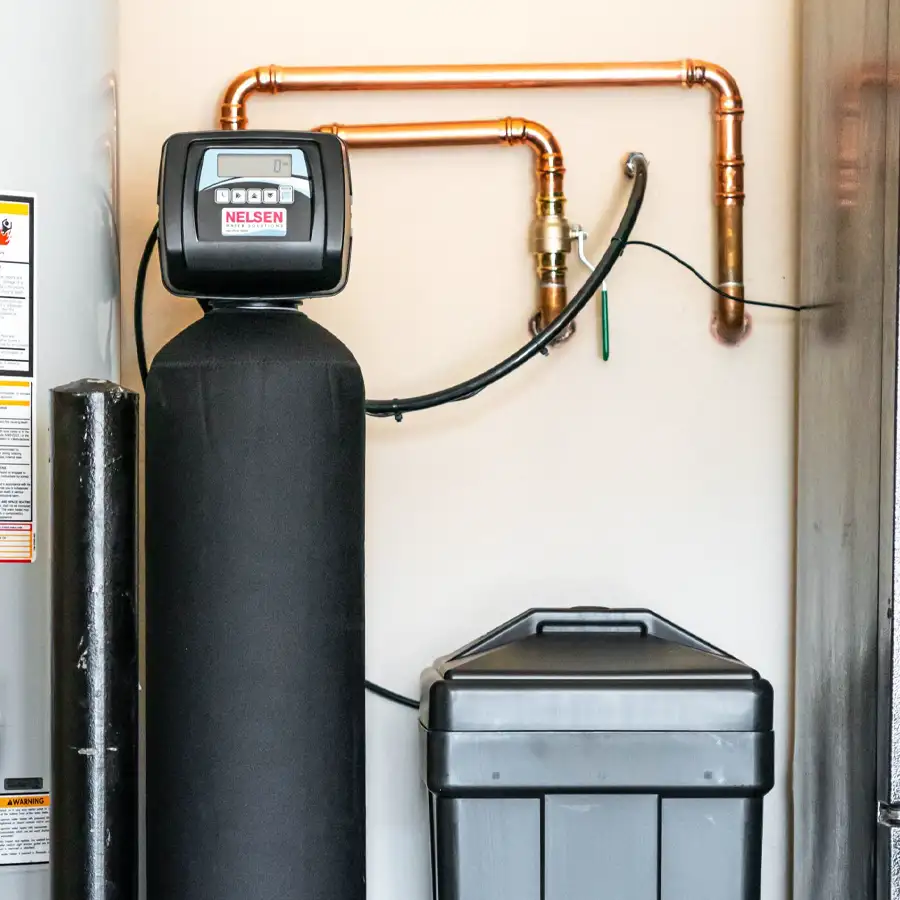
Water Softener Repair, Maintenance & Installation Services in Grove City, OH
Hard water affects nearly 90% of the nation. Because Central Ohio is known for having hard water in certain areas, the installation and use of a water softener gives homeowners better, softened water that feels better overall and makes cleaning better. Softened water also tastes better without all the so-called “hard” water minerals that damage plumbing equipment, bathtubs and sinks. To learn more about hard water and our low-cost water treatment solutions, check the information below see why you should install a new water softener in your Central Ohio area home or business. Call Grove City Plumbing & Drain for free water softener estimates on professional installation for your home or business. We can come over and give you all your options.
Water softeners are excellent for plumbing equipment and plumbing-related appliances using water, such as dishwashers, washing machines and water heaters. Water softeners remove hard water minerals (like calcium, magnesium, and iron) from the water.
We’re Friendly & Professional
Our certified and expert plumbers will treat you with respect, and we’ll always be on time.
We're Knowledgeable & Experienced
Our plumbers have years of experience in the plumbing industry, so they can tackle any issue that comes up!
We’re Honest & Reliable
We make sure everything is completed properly before leaving your home or business premises at the end of each day (or night).
How Do Water Softeners Work?
Water softeners are water treatment systems used to soften water to remove unwanted minerals that make it “hard.” Water softeners are water filtration products that remove minerals like calcium and magnesium, which make water hard or harsh. Hard water often has a unique odor that can be unpleasant throughout a home or building. Hard water minerals are removed as the water is sent through the water softener. After water is sent through the softening system, it’s much easier on skin and better for plumbing and home appliances.
If you’re online looking for a “water softener expert” for your home, you’re in the right place. Our experts at Grove City Plumbing & Drain start the process by determining the hardness of your water and figuring out which system would be best for your home. Grains per gallon is the standard unit of measurement. Brine tanks are included in each water softening system. The brine tank holds all the salt used to soften the water. The water level in your water softener should always remain a bit lower than the level of salt in the tank. The water in your system has to come into contact with this salt to consume it and achieve the right concentration of brine. As a result, the water softener’s tank is filled with tiny resin beads, that bond to minerals when they come into contact with them. This removes the minerals needed to be removed as the water exits the tank.

Benefits of Water Softeners
Around 85 % of modern homes have hard water. If you live in Greater Columbus and want to enhance your home’s water quality, you should call Grove City Plumbing & Drain right away. Check out our long list of benefits for updating or setting up a new water softener and water filtration system:

Keeps Dishware Cleaner
Excess minerals in the water can cause spots on bathtubs, faucets, sinks, dishes, and everything household water comes into contact with. These ugly stains are kept at bay by eliminating these elements from the water supply. It’s not unusual to see a ring of dirt and grime encircling your sink and bathtubs since soap doesn’t rinse well with hard water. This soap goes down the drain a lot easier if you use softened water.

Better Tasting Water
While the purpose of a water softener and water purifier is usually about much more than flavor, one of the most common reasons homeowners have them installed is to improve the taste of their water for cooking and drinking. Better-tasting water is one of the biggest benefits of installing a water filtration system and/or water softener. Food and beverages taste better when water is softened and purified.

Saves Money
Soft water flows free of minerals and ions that cause buildup in and around plumbing systems, appliances and pipes. This saves a homeowner money from having to make expensive repairs. Mineral buildup in pipes and drain narrow down the available pathway opening for water to move through freely. This build-up needs more pressure from pumps. It progressively gets worse as more builds up over time. It can also increase the amount of energy required to keep water cold or heated. The buildup eventually wreaks havoc on household appliances, which means repair costs down the road or even replacement costs for dishwashers, laundry machines, garbage disposals, water heaters, ice makers and more.

Less Scum Build Up and Scale
Reducing calcium build-up and scale deposits is one of the most essential reasons a lot of homeowners install a water softener. As a result, having a quality water filtration system means homeowners don’t have to spend time cleaning and getting rid of scale buildup around showers, tubs, drains, sinks, and other surfaces. Additionally, homes with softened water don’t need as much cleaning detergent or soap for cleaning. Water softeners make it easier to clean things and keep things clean.
WHY US?
Why Choose Grove City Plumbing & Drain
No matter what type of drain problem you might have, we are always fully committed to providing you with the most courteous and professional plumbing services. We have residential clients throughout Ohio. Our local licensed plumbers can answer any of your questions as part of a free in-home consultation. We can repair your plumbing problems to complete satisfaction in a timely and affordable manner.
Because of how much we use our toilets, sinks, bathtubs, showers, garbage disposals, laundry machines, and other kitchen appliances, we all depend on our drain system tremendously. Because of this, it’s not uncommon for them to develop clogs over time and become slow or completely blocked. Some of the more common things that clog up household drains and wreak havoc on plumbing include things like oil, hair, grease, food, coffee grounds, toys, foreign objects, dirt, grime, utensils, minerals, hygiene products, diapers, wet wipes, paper towels, and more.

FAQ: Water Softeners
Water softeners are essential for reducing hard water problems in homes and businesses, improving water quality and protecting plumbing systems. In this FAQ section, we answer common questions about how water softeners work, their benefits, and how to maintain them effectively. Whether you’re considering a water softener or need help with an existing system, this guide provides the insights you need!
What is a water softener?
Water softeners are water filtration systems that eliminate magnesium and calcium from hard water and improve plumbing systems and how they function. Water softeners remove unwanted minerals that cause hard water, and softer water is better for pipes and plumbing-related appliances connected to it.
What is hard water?
Hard water contains unwanted minerals, at least a lot more than regular water. The two biggest types of minerals in hard water include magnesium and calcium. They are the reason why often soap doesn’t dissolve in hard water. Guidelines for water classification include: 0 to 60 milligrams per liter as calcium carbonate is classified as soft; 61 to 120 mg per liter is moderately hard; 121 to 180 milligrams per liter is hard, and more than 180 per liter as very hard.
How often should salt be added to a water softener?
During water softener regeneration, salt is usually added to the water tank’s reservoir. Water softeners are typically tested one time each month. To ensure adequate levels of soft water production, keep your salt level about halfway full. Because newer models are more efficient with salt usage, experts recommend adding salt every 6 to 8 weeks. However, it’s always a good idea to check regularly to ensure everything is working the way you need it to.

SCHEDULE YOUR SERVICE TODAY!
Fast, Reliable, and Affordable Plumbing Solutions Are Just a Click Away!
FREE ESTIMATE
Request a Free Plumbing Estimate in Grove City, Ohio
We’re the folks at Grove City Plumbing & Drain, and we’d love to help you with your plumbing needs. We do everything from drain cleaning to sump pump repairs—you name it, we’ve probably done it. And we’re not just talking about big jobs like new water heater installations or major remodels: even if you just need a simple repair done on an old toilet, you can count on us!
If you live in Grove City, Ohio and are looking for a plumber who will do the job right and make sure that you get exactly what you need without breaking the bank, give us a call today! We’ll be happy to send one of our expert plumbers over right away so we can get started making your home safe again.




